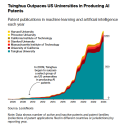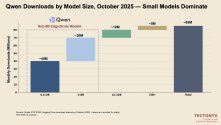Aravind's "China AI bad" takes are not enough to win him fans or keep him in business . He has to ship great products
In a twist that stunned Silicon Valley’s AI community, Perplexity, the fast-rising startup billing itself as the next big rival to Google Search, has been ranked the No. 1 “most likely to fail” AI startup at a major San Francisco tech event. According to a report by Business Insider, the verdict came from a live poll conducted at the Cerebral Valley AI Conference, attended by more than 300 founders, researchers, and investors, the very people shaping the next phase of artificial intelligence.
For Perplexity, the vote doesn’t necessarily spell doom. (REUTERS File)
A harsh spotlight on Perplexity’s meteoric rise
Perplexity, founded by Aravind Srinivas, has spent the past year positioning itself as an AI-native answer to traditional search engines, boasting cleaner results, conversational responses, and a more “intelligent” web experience. The company’s rapid ascent, powered by high-profile investors and valuations reportedly soaring between $14 billion and $50 billion, made it one of the hottest names in tech.
But at Cerebral Valley, attendees voiced doubts about whether that pace is sustainable. Many cited overvaluation, aggressive expansion, and what one investor described as “fundraising on hype rather than fundamentals.” The poll ranked Perplexity first among startups “most likely to fail,” followed closely by OpenAI, signalling a growing unease within the AI sector about inflated expectations and fragile business models.
A Perplexity spokesperson responded with humour, reportedly calling the gathering the “Judgmental Valley Conference.” Yet, the mood in the room suggested genuine concern about whether even the most celebrated AI companies can keep up with their own ambitions.
The industry’s moment of reckoning
The outcome reflects a broader anxiety across Silicon Valley, that the current AI boom might be heading toward a dot-com-style correction. Several venture capitalists at the event acknowledged that the sector is “deep in bubble territory,” though some insisted this is a necessary stage of evolution.
“We’re definitely in a bubble,” one investor said, “but the real question is which companies will become generational, and which will vanish.”
For Perplexity, the vote doesn’t necessarily spell doom. Instead, it highlights the fragile balance between innovation and speculation at the centre of the AI race. The startup’s challenge now is to prove that its technology, and not its valuation, will define its legacy.
With AI firms attracting record-breaking funding and global scrutiny, the poll served as a reality check: in an industry moving at breakneck speed, only a handful of players may ultimately stand the test of time. Whether Perplexity will be one of them remains an open, and billion-dollar, question.
I don't even understand why Perplexity is called a rival to chatgpt. Its not even a LLM. Its just a wrapper. Just more delusions. You would figure people who use AI so much in places like India would at least know the basic difference.
You are using an out of date browser. It may not display this or other websites correctly.
You should upgrade or use an alternative browser.
You should upgrade or use an alternative browser.
Artificial Intelligence thread
- Thread starter 9dashline
- Start date
they fine tuned a "freedom" version of deepseek r1
In a twist that stunned Silicon Valley’s AI community, Perplexity, the fast-rising startup billing itself as the next big rival to Google Search, has been ranked the No. 1 “most likely to fail” AI startup at a major San Francisco tech event. According to a report by Business Insider, the verdict came from a live poll conducted at the Cerebral Valley AI Conference, attended by more than 300 founders, researchers, and investors, the very people shaping the next phase of artificial intelligence.
For Perplexity, the vote doesn’t necessarily spell doom. (REUTERS File)
A harsh spotlight on Perplexity’s meteoric rise
Perplexity, founded by Aravind Srinivas, has spent the past year positioning itself as an AI-native answer to traditional search engines, boasting cleaner results, conversational responses, and a more “intelligent” web experience. The company’s rapid ascent, powered by high-profile investors and valuations reportedly soaring between $14 billion and $50 billion, made it one of the hottest names in tech.
But at Cerebral Valley, attendees voiced doubts about whether that pace is sustainable. Many cited overvaluation, aggressive expansion, and what one investor described as “fundraising on hype rather than fundamentals.” The poll ranked Perplexity first among startups “most likely to fail,” followed closely by OpenAI, signalling a growing unease within the AI sector about inflated expectations and fragile business models.
A Perplexity spokesperson responded with humour, reportedly calling the gathering the “Judgmental Valley Conference.” Yet, the mood in the room suggested genuine concern about whether even the most celebrated AI companies can keep up with their own ambitions.
The industry’s moment of reckoning
The outcome reflects a broader anxiety across Silicon Valley, that the current AI boom might be heading toward a dot-com-style correction. Several venture capitalists at the event acknowledged that the sector is “deep in bubble territory,” though some insisted this is a necessary stage of evolution.
“We’re definitely in a bubble,” one investor said, “but the real question is which companies will become generational, and which will vanish.”
For Perplexity, the vote doesn’t necessarily spell doom. Instead, it highlights the fragile balance between innovation and speculation at the centre of the AI race. The startup’s challenge now is to prove that its technology, and not its valuation, will define its legacy.
With AI firms attracting record-breaking funding and global scrutiny, the poll served as a reality check: in an industry moving at breakneck speed, only a handful of players may ultimately stand the test of time. Whether Perplexity will be one of them remains an open, and billion-dollar, question.
I don't even understand why Perplexity is called a rival to chatgpt. Its not even a LLM. Its just a wrapper. Just more delusions. You would figure people who use AI so much in places like India would at least know the basic difference.
give them some credit lol
As noted by others here, Chinese open-source models have gained ground based on ease of adoption.
Taxi how dominant Qwen has been compared to Deepseek.As noted by others here, Chinese open-source models have gained ground based on ease of adoption.
keep in mind that it's hard to do derivatives of Deepseek because the model size is so large. Qwen is the winner here. I have said that many times and have found that to be the case when I'm using it locally. Qwen models are good enough and they are compatible with everything. They are like ESP32 of AI.
I agree, I think it's being massively slept on outside of China.
keep in mind that it's hard to do derivatives of Deepseek because the model size is so large. Qwen is the winner here. I have said that many times and have found that to be the case when I'm using it locally. Qwen models are good enough and they are compatible with everything. They are like ESP32 of AI.
Reminder that Baidu is really terrible in AI. And they are going to get destroyed as more people do searches elsewhere like Tencent or Douyin.
The role of trust as it pertains to speed of adoption and diffusion should not be underestimated.
In China, 87 percent of people said they trusted AI, compared with 67 percent in Brazil, 32 percent in the US, 36 percent in the United Kingdom, and 39 percent in Germany, the Edelman poll released on Tuesday showed. More than seven in 10 Chinese respondents said they expected AI to play a role in solving a range of societal issues, including climate change, mental illness, poverty and polarisation. Only one-third of Americans said they expected AI to reduce poverty and polarisation, though half predicted a positive impact on climate-related challenges. While 54 percent of Chinese said they embraced greater use of AI, just 17 percent of Americans answered the same, according to the survey.
Trust was highest among young people, though still much lower in Western countries. Eighty-eight percent of Chinese aged 18-34 said they had faith in the technology, compared with 40 percent of Americans in that age group.
A piece on Tsinghua's starring role in AI research, patents, startups, etc.

Tsinghua is buzzing these days. While the school has long been the nation’s leading institution for science and technology — Stanford University, Massachusetts Institute of Technology and Carnegie Mellon rolled into one, as some describe it — this has been a breakthrough year for China. The success of DeepSeek, the artificial intelligence startup with its innovative large language model, has brought a newfound confidence to these young brainiacs that they have an opportunity to compete with — or beat — the world’s best. The school’s graduates have founded at least four of the country’s top AI startups, so far.
The school’s professors and students are quietly accumulating massive amounts of intellectual property. They already had more AI research papers among than any other school at last count, and they receive more patents each year than MIT, Stanford, Princeton and Harvard combined. Tsinghua collected 4,986 AI and machine learning patents between 2005 and the end of 2024, including more than 900 last year, according to the data analytics service LexisNexis. Overall, China now accounts for more than half of all active patent families globally in those fields.


